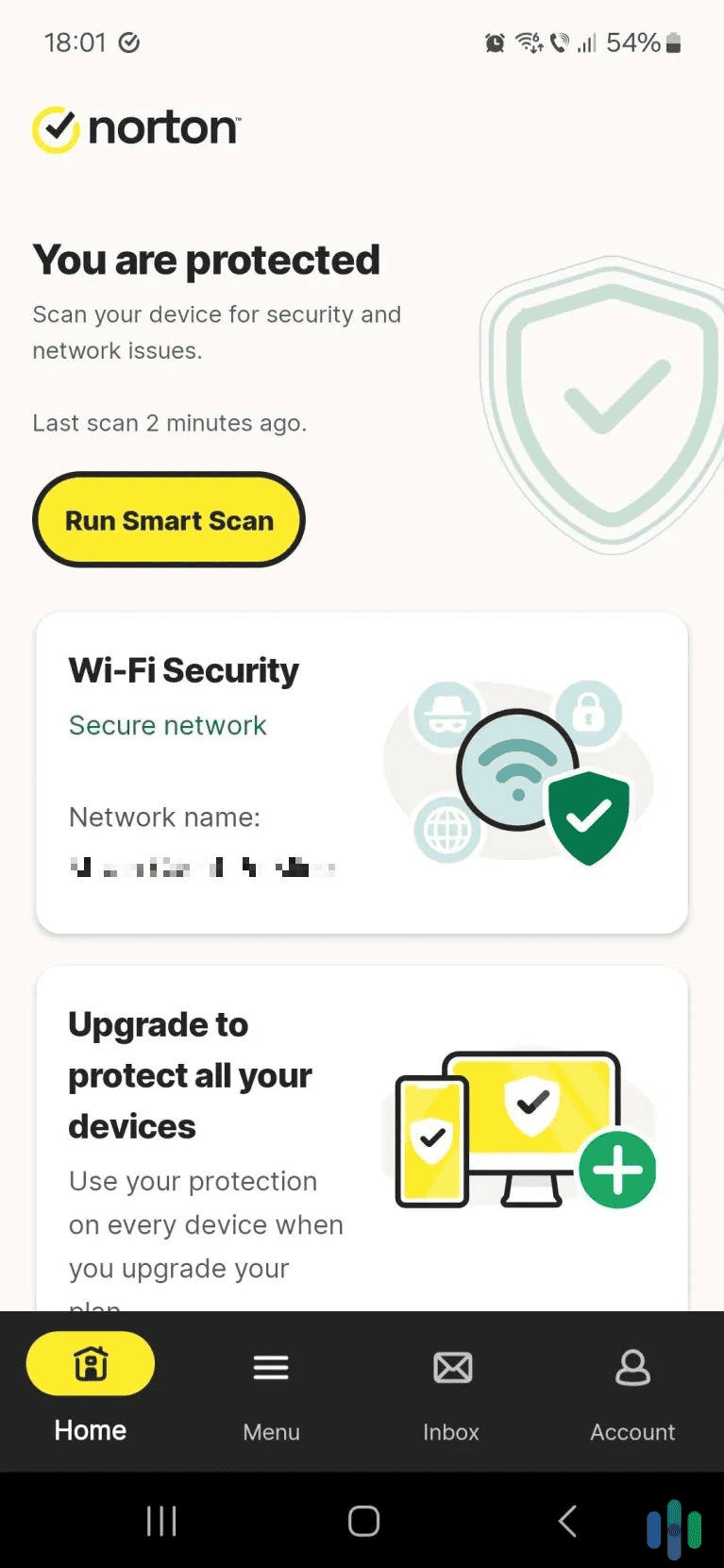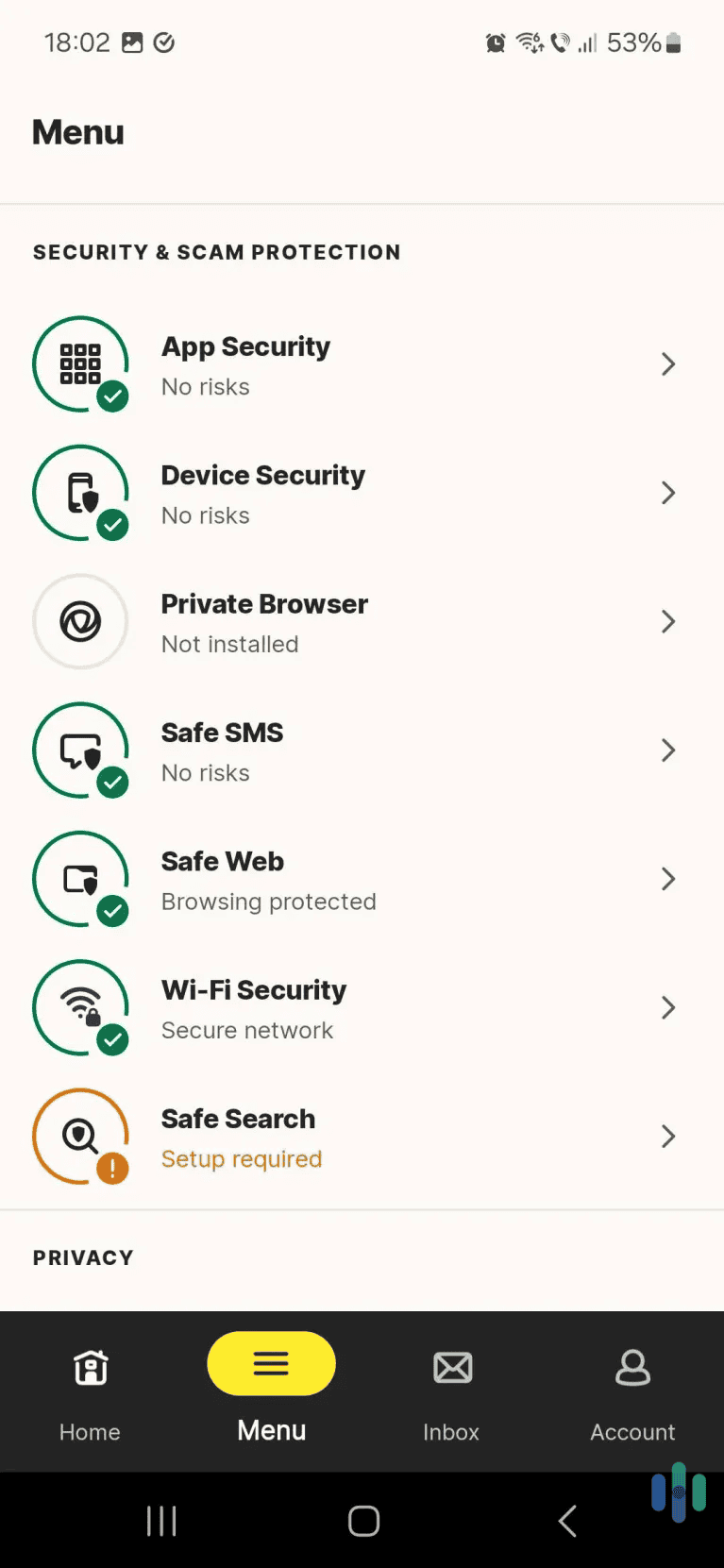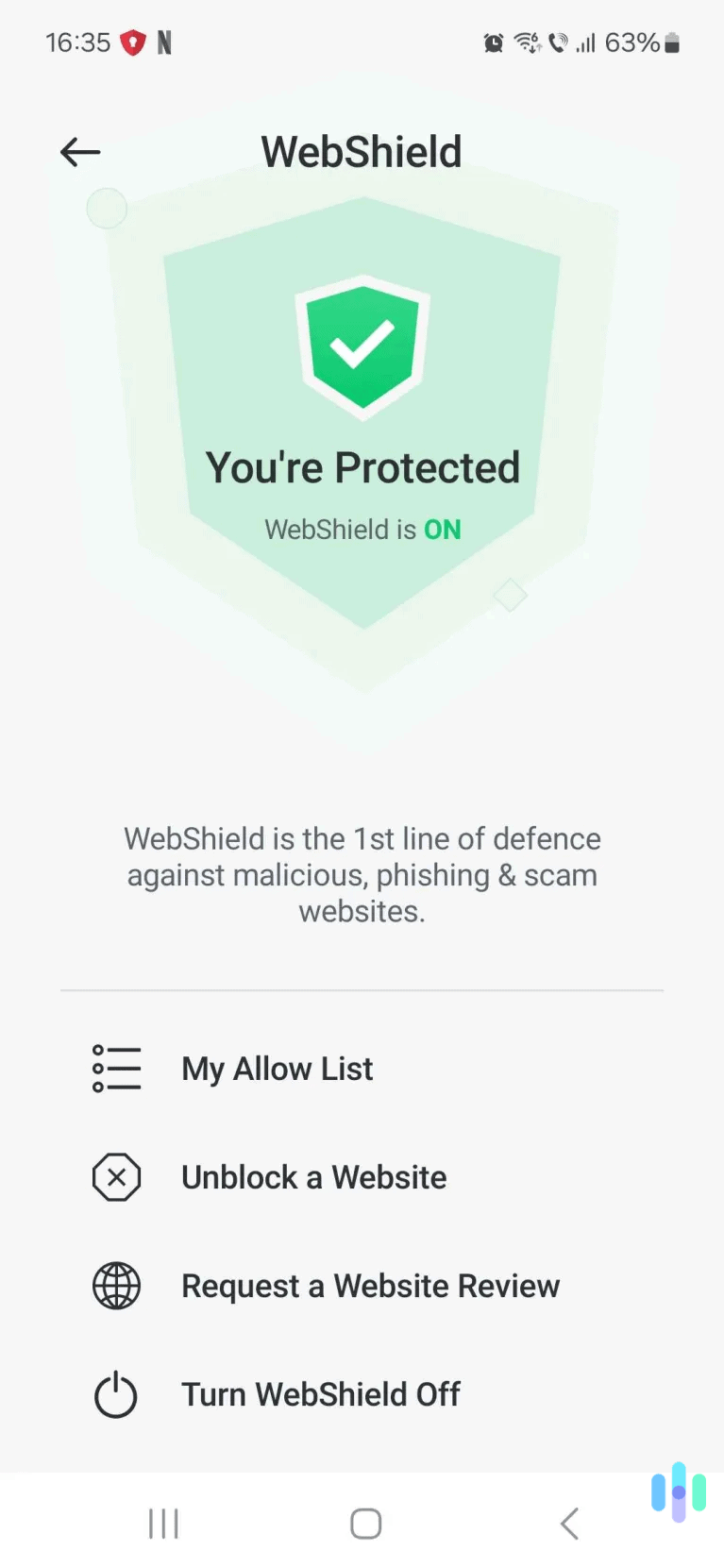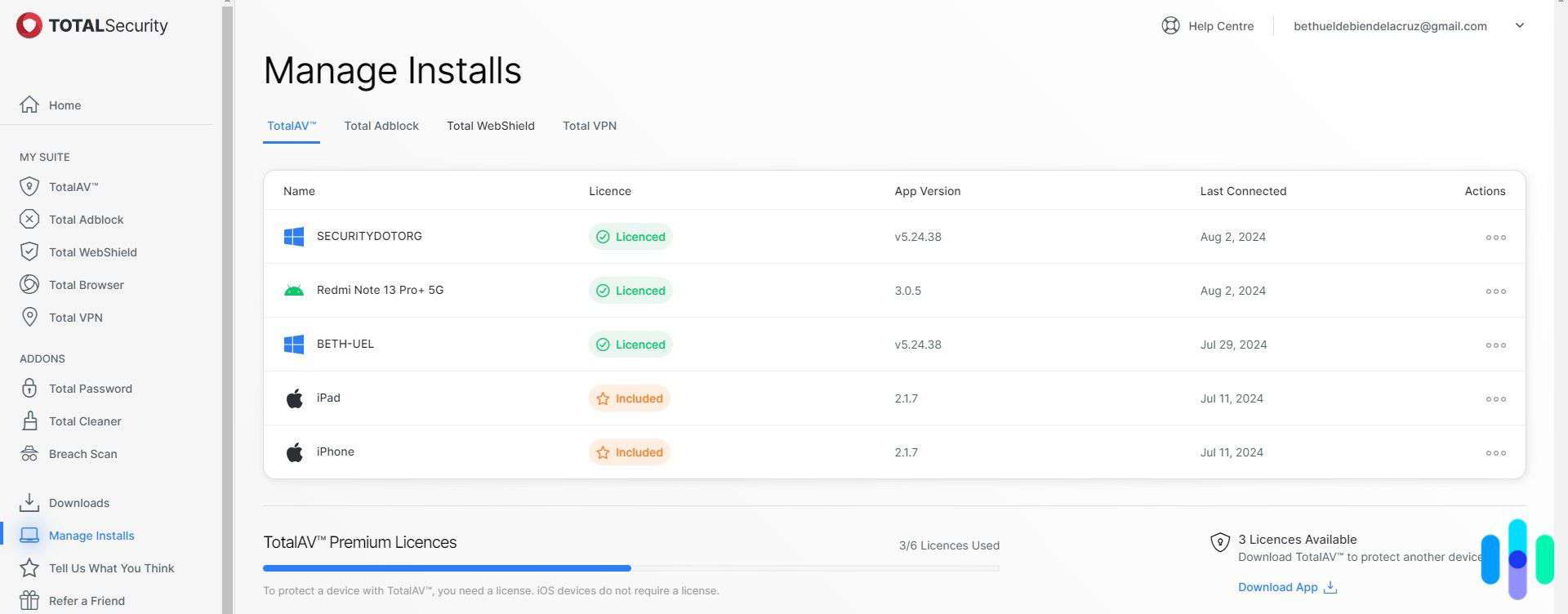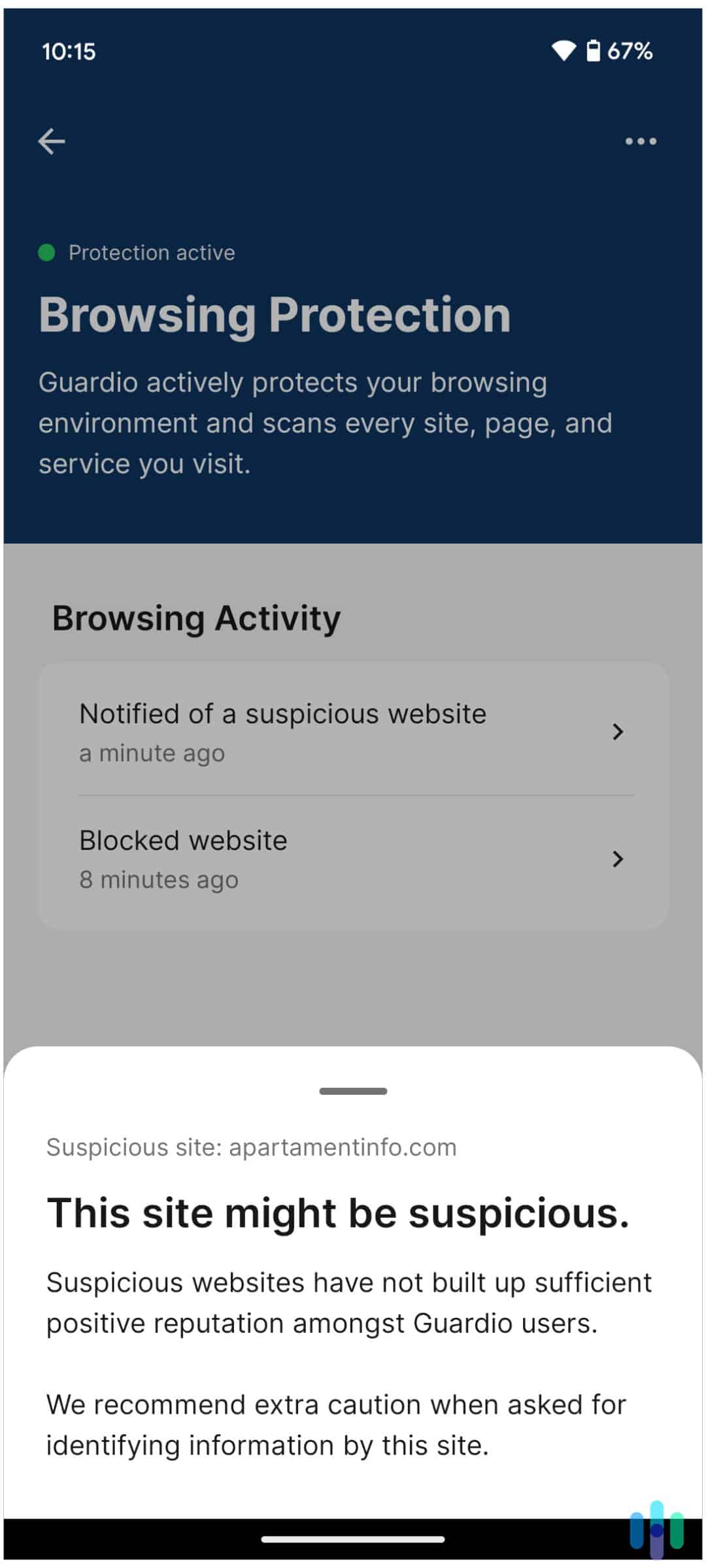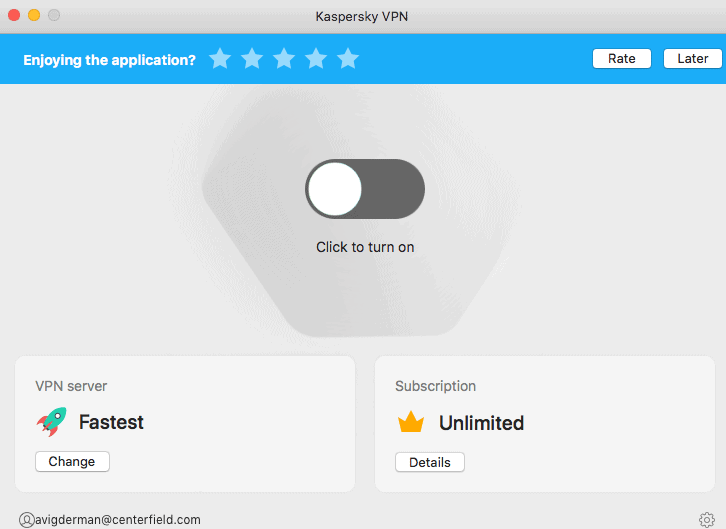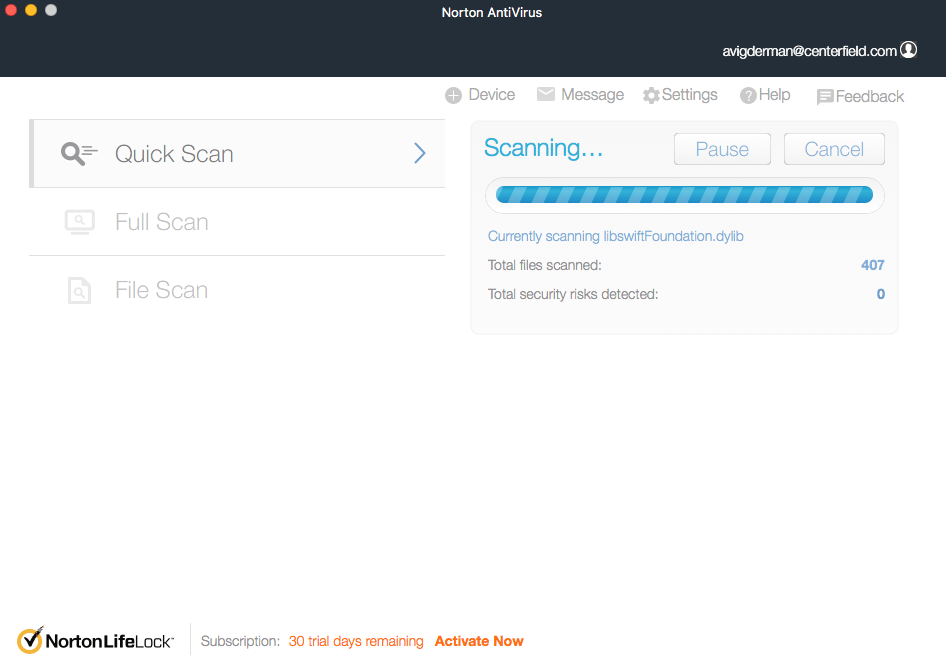The Best Antivirus Software for Chromebook in 2026
Our top pick, Norton Antivirus, offers protection beyond malware and phishing detection.
- Passed all malware and phishing tests
- Also offers password manager, VPN, and identity theft protection
- User-friendly app with customization features for experienced users
- Almost perfect malware detection rate
- WebShield feature that detects suspicious extensions
- Affordable subscriptions
- Excellent browser and email protection
- Includes dark web monitoring for email addresses and phone numbers
- Subscriptions for individuals, couples, and families
ChromeOS is safe from traditional malware, but modern threats such as phishing, malicious browser extensions, and data-stealing websites can still affect Chromebook users. That’s why we recommend that you use antivirus software.
After testing dozens of security solutions on ChromeOS devices, we narrowed down the best antivirus for Chromebook to three picks: Norton, TotalAV, and Guardio. Each one stands out for different reasons. Whether it’s comprehensive identity protection, budget-friendly pricing, or browser security, these are the apps we think you should install.
>> Find Out: Do You Still Need Antivirus Protection Software in 2026
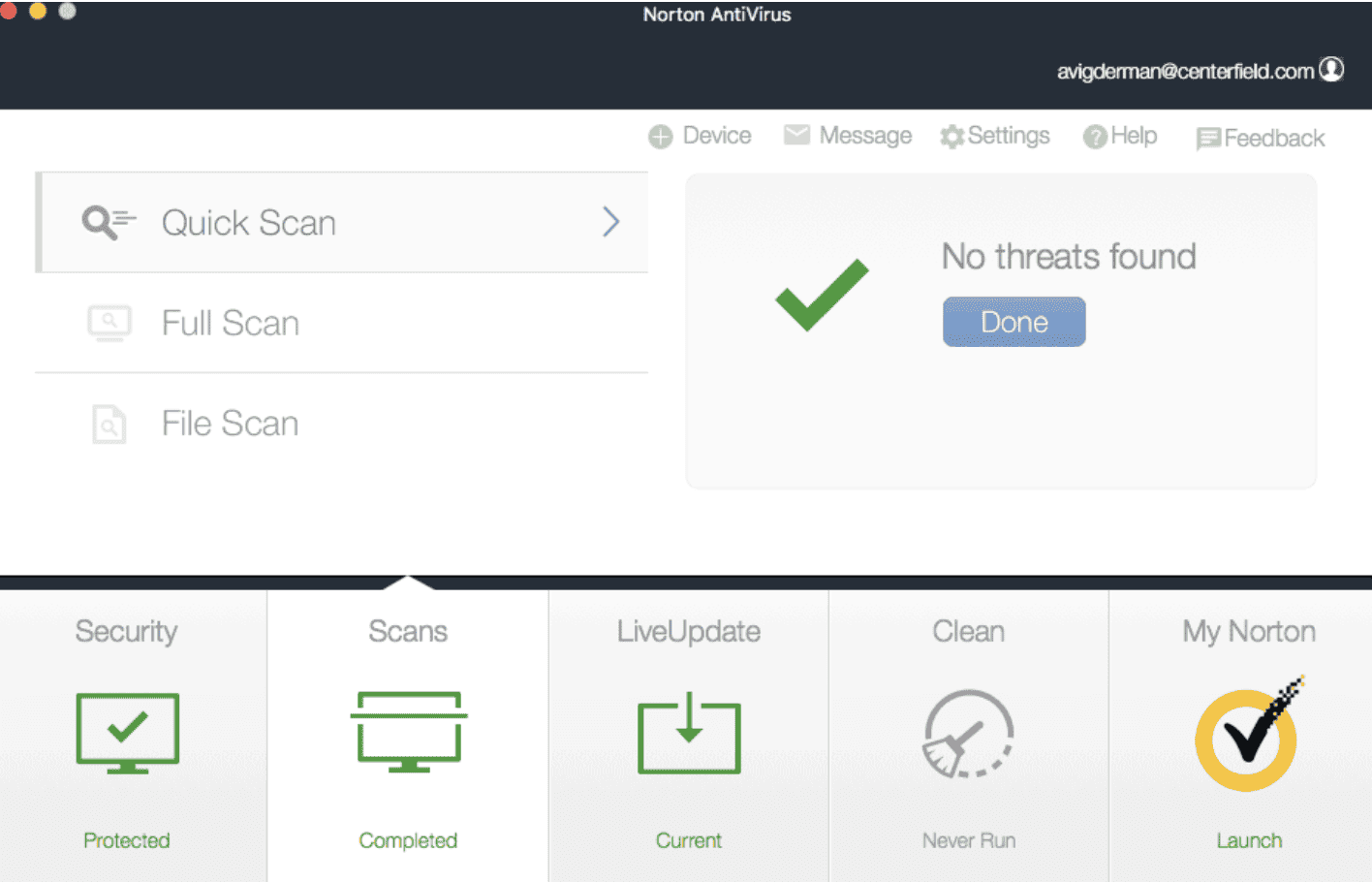
Overview: Our Top Chromebook Antivirus Picks
- Norton Antivirus - Best Detection Features
- TotalAV Antivirus - Best Protection Suite
- Guardio - Best Web Protection
The Best Antivirus Software for Chromebook Side-by-Side
| System |
Norton Antivirus

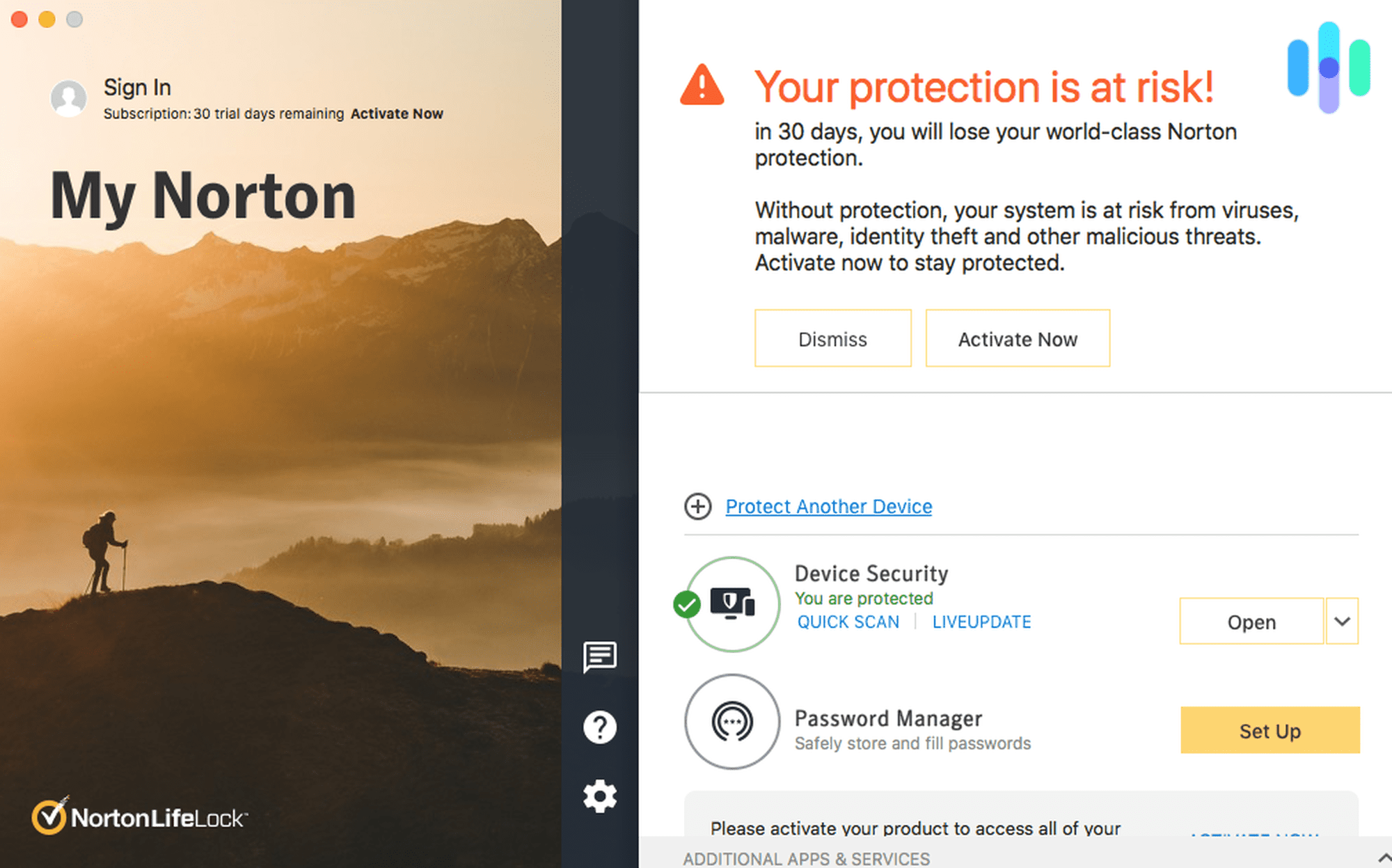
|
TotalAV Antivirus

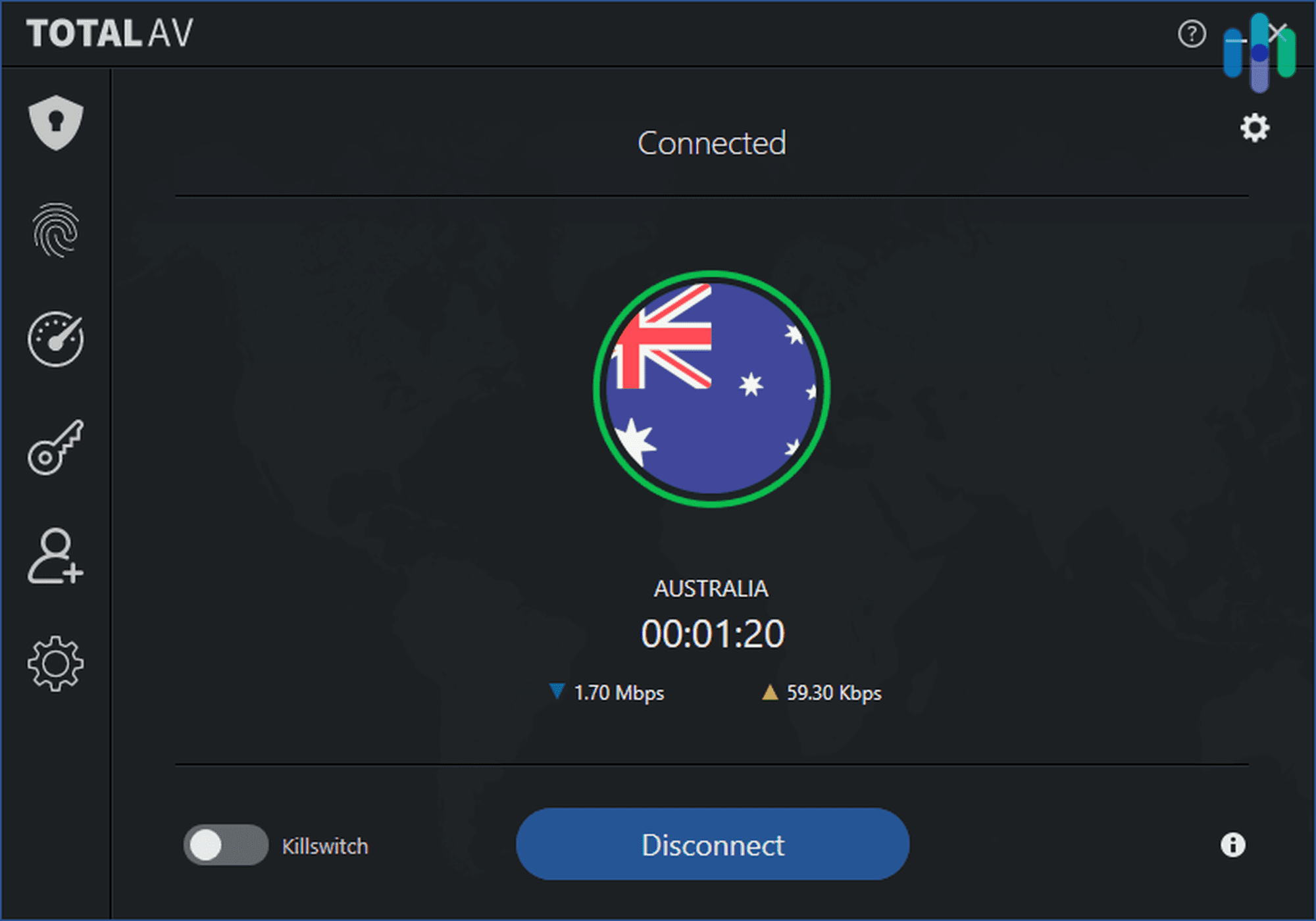
|
Guardio
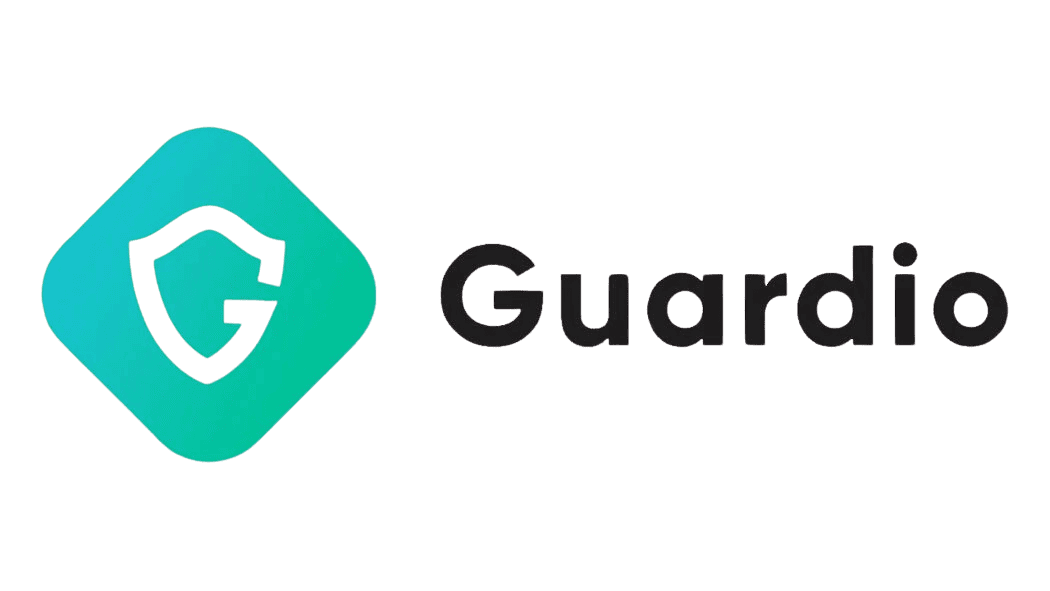
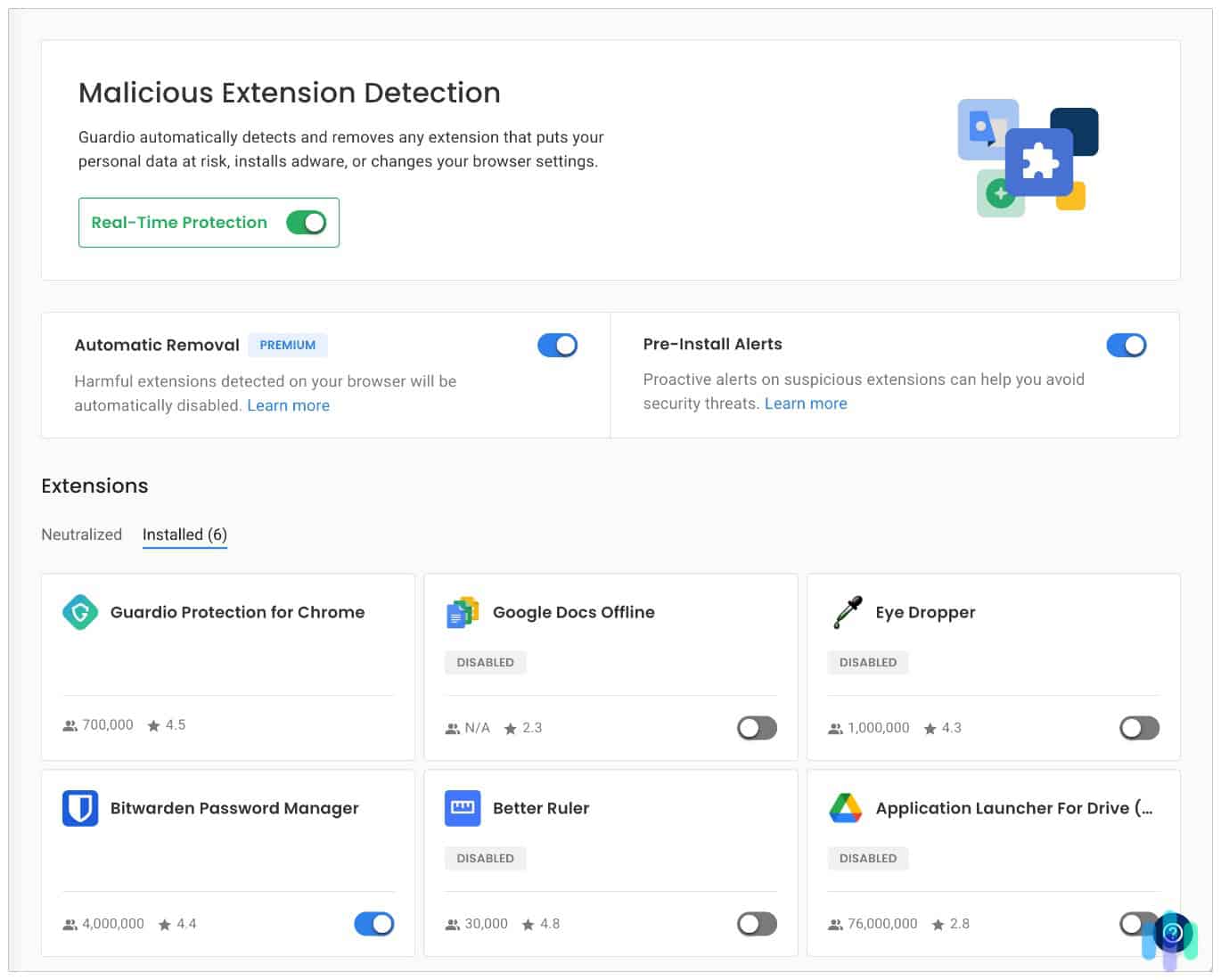
|
|---|---|---|---|
| Ranking | 1st | 2nd | 3rd |
| Ratings | 9.7/10 | 9.3/10 | 8.9/10 |
| Starting Price | $19.99 for the first year | $29 for the first year | $119 for the first year |
| Maximum Number of Devices | 10 | 8 | 5 |
| Free Trial | 14 Days | 30 Days | Free version and 7-day free trial of premium features |
| Web Protection | Yes | Yes | Yes |
| Read Review | Norton Antivirus Review | TotalAV Antivirus Review | Guardio Review |
Our Methodology for Testing the Best Cheap Antivirus
Our testing methodology focused on real-world protection scenarios that Chromebook users face daily. We evaluated each antivirus solution for at least 30 days across multiple ChromeOS devices, including both ARM and Intel-based models, to ensure consistent performance. Our final assessment focused on five key criteria:
- Web protection effectiveness: We assessed how well each app blocks phishing attempts, malicious websites, and suspicious downloads.
- System impact: We tracked CPU usage and battery while the antivirus runs in the background as we perform daily activities.
- Ease of use: We evaluated the installation process and user interface. Our team also looked at how easy it is to navigate through features and access reports.
- Feature set: In addition to malware protection, we tested the extra tools that come with the app, such as VPNs, password managers, and ad blockers.
- Value for money: Extra features are nice, but we don’t want them padding out the subscription price. We weighed up whether we’re getting bang for our buck.
After testing these apps against everyday use cases, we gained a clearer understanding of which antivirus tools improve Chromebook security. This approach helped us narrow down the apps that balance protection, performance, and usability, while providing bang for our buck.
-
1. Norton Antivirus - Best Detection Features
 View Plans Links To Norton
View Plans Links To NortonProduct Specs
Virus Detection Yes Malware Detection Yes Firewall Yes Full, quick, and scheduled scans Yes Real-time protection Yes Behavior-based monitoring Yes 
Norton tops our list because it provides more than just antivirus protection. You’ll also get a VPN, password manager, and dark web monitoring, which can all come in handy for safer online browsing. Those features sound like they would drain the life from your Chromebook, but it barely used our CPU or affected performance. Norton is more expensive than other apps on this list, but there are many reasons why it’s one of the best antivirus apps on the market.
What We Like
- Comprehensive protection beyond just malware
- Excellent phishing detection rates
- Includes password manager and VPN
- 24/7 customer support
- Dark web monitoring for personal information
What We Don’t Like
- More expensive than competitors
- Some features require separate apps
- Annual commitment required for best pricing
Norton Antivirus Setup and Installation
Setting up Norton on a Chromebook takes about five minutes from start to finish. We installed the Norton Mobile Security app from the Play Store. After a few steps, the app immediately began to scan websites and downloads for threats.
The initial configuration wizard also walked us through how to turn on different protection layers, including safe search, anti-tracking, and password manager integration. Throughout the process, Norton didn’t overwhelm us with technical settings, which is impressive considering it offers robust protection out of the box.
Despite the number of security tools Norton offers, it was easy to navigate the app. Our Norton Antivirus Experience
Norton’s web protection engine caught all phishing attempts during our testing. The app uses a combination of URL reputation checking, real-time threat intelligence, and machine learning to identify dangerous sites before they can cause harm. We tried visiting a suspicious site and Norton displayed a warning page explaining the threat level.
Beyond URL scanning, Norton analyzes downloaded files through its cloud-based scanning engine. This approach works particularly well on Chromebooks since it doesn’t require local virus definitions or resource-intensive scanning processes. During our month-long testing of Norton Antivirus, it successfully blocked all malicious download attempts without generating false positives on legitimate files.
Expert Tip: We recommend enabling Norton’s Safe Search feature to see security ratings directly in Google search results. This helps you avoid dangerous sites before clicking.
Norton Antivirus Protection Features
Norton offers more than antivirus protection for Chromebooks and Android devices. Norton sits in our top spot because of the different ways it protects your Chromebook. It can use AI to identify and protect your device from phishing, malware, and fraud. You’ll even find subscription options that include dark web monitoring and others that bundle it with LifeLock, if you want protection from identity theft. (Tip: Look for LifeLock with Norton 360 plans.)
If your identity is stolen, LifeLock assigns a dedicated specialist to help resolve issues. LifeLock even reimburses you up to $1 million in stolen funds, plus up to $1 million each for legal and personal expenses related to identity theft recovery. Combined with the password manager and VPN, you’re getting a complete digital security package rather than just antivirus protection.
>> Learn More: LifeLock Identity Theft Protection Review
Norton Antivirus Costs
You can get started with Norton Antivirus for as little as $29.99 for the first year. We recommend considering a Norton 360 subscription instead. In our opinion, Norton 360 Deluxe offers the best bang for your buck with the inclusion of a VPN, password manager, dark web monitoring, and 50GB of cloud storage for only $50 for the first year.
If you want to include LifeLock, you’ll need a completely different subscription. LifeLock with Norton 360 bundles range from $99.99 to $299.99 for the first year. Offering so many subscription options can be overwhelming, especially if you only need basic web protection. We think reviewing each plan and narrowing down your options is worth it, considering the level of protection Norton offers.
>> Find Out: Do Chromebooks Need Antivirus Software in 2026?
-
2. TotalAV Antivirus - Best Protection Suite
 Get TotalAV Links To TotalAV
Get TotalAV Links To TotalAVProduct Specs
Virus Detection Yes Malware Detection Yes Firewall No Full, quick, and scheduled scans Yes Real-time protection Yes Behavior-based monitoring No 
TotalAV strikes the right balance between affordability and advanced security protection. You’ll get the essentials, like malware blocking, phishing protection, and safe browsing. TotalAV also includes a VPN and system optimization tool that competitors normally charge extra for. Norton Antivirus might offer more advanced features, but TotalAV delivers reliable protection at a fraction of the price.
What We Like
- User-friendly interface
- Includes system optimization tools
- Strong real-time protection
- Generous device limits on higher tiers
What We Don’t Like
- Limited customer support hours
- Renewal prices increase significantly
- Fewer advanced features than Norton
TotalAV Setup and Installation
The entire TotalAV setup process took us less than three minutes, with no complex configuration required. Once we installed the app from the Play Store and the Web Shield Chrome extension, we had instant protection.
WebShield is the first line of defense for TotalAV, as it stops us from accessing unsafe websites and opening phishing pages. The dashboard design is arguably the most intuitive interface among the antivirus solutions we tested. Real-time threat statistics, protection status, and quick actions are all accessible with a single click.
FYI: Chromebooks can run most Android apps via the Google Play Store. If you’re already comfortable with the best antivirus apps for Android, you might find you can run a similar version on ChromeOS.
Our TotalAV Experience
TotalAV’s real-time protection engine blocked 97 percent of phishing attempts and 98 percent of malware downloads in our tests. While slightly behind Norton’s detection rates, the difference is negligible. We found TotalAV responded quickly to threats, typically blocking dangerous sites within milliseconds of attempting access.
One standout feature is TotalAV’s VPN. This adds an extra layer of security when using public Wi-Fi, encrypting your connection to prevent data interception. The VPN servers are fast enough for streaming and general browsing, but we still recommend using a dedicated VPN for more server options and extra protection.
Expert Tip: We recommend running TotalAV’s data breach tool monthly to see if your email addresses have appeared in any recent security breaches.
TotalAV Protection Features
The system optimization feature is another useful TotalAV tool. The browser cleaner removes tracking cookies, cache files, and browsing history with a single click. It also identifies potentially unwanted extensions and helps you delete any that are compromised or slow down browsing. After running it for the first time, we noticed pages loading up faster and apps running smoother.
Unlike Norton, TotalAV doesn’t include identity theft protection features. The data breach scanners search for leaked email addresses, but that’s about it. If you sign up with TotalAV, you’ll need a separate subscription for an identity theft protection service.
>> Keep Reading: The Best Identity Theft Protection Services of 2026
TotalAV Costs
Starting at just $29 for the first year, TotalAV offers great value for anyone looking for a budget-friendly antivirus solution. The base plan protects three devices, while the Internet Security plan ($39) covers five devices and adds more advanced features. Even the renewal price of $119 is more affordable than some competitors like Norton.
We could manage all the devices using TotalAV in the user-friendly web dashboard, so we never go over our limits. -
3. Guardio - Best Web Protection
Get Guardio Links to GuardioProduct Specs
Virus Detection Yes Malware Detection Yes Firewall No Full, quick, and scheduled scans No Real-time protection Yes (browser-based) Behavior-based monitoring Yes Guardio specializes in blocking phishing sites, malicious downloads, and harmful websites before they cause damage, all while using minimal system resources. With an easy-to-use interface, accurate real-time detection, and family plans that cover up to five users, we recommend Guardio for anyone focused on web protection.
What We Like
- Specialized web protection focus
- Minimal system resource usage
- Excellent phishing detection
- Family plan covers up to five users
What We Don’t Like
- No VPN or password manager included
- Expensive plans compared to competitors
- Can’t remove viruses or malware
Guardio Setup and Installation
Guardio takes a different approach than traditional antivirus software, focusing exclusively on browser-based threats. This also made the setup easy. All we had to do was install the browser extension and Guardio began detecting phishing sites, malicious downloads, and compromised search results in real-time.
We found that the notification system strikes the right balance between keeping you informed and avoiding annoyance. Critical threats trigger immediate alerts, while routine blocks are logged silently unless you choose to review them. This approach keeps you aware of your security status without constant interruptions.
Guardio warns us when we’re about to access a potentially malicious site. Our Guardio Experience
During our Guardio testing, the extension identified sophisticated phishing attempts that mimicked legitimate banking and shopping sites. It turns out that Guardio uses AI to recognize and flag scams, similar to how Norton protects users against scams.
The system caught most phishing tests, including several threats that hadn’t yet been cataloged by other security vendors. However, we had to check if Guardio caught them, since it doesn’t always send a notification about blocks made in the background.
FYI: Guardio’s extension icon color indicates your protection status. Green means safe, yellow is caution, and red refers to blocked threats. Clicking the icon shows recent activity, blocked threats, and your overall security score.
Guardio Protection Features
Beyond active threat blocking, Guardio excels at monitoring your digital footprint across the internet. The service continuously scans data breach databases and alerts you immediately if your information appears in a compromise. Guardio found one of our old credit card numbers and a data breach featuring our email.
The identity monitoring extends to detecting when websites attempt to harvest your personal information through hidden forms or tracking scripts. Guardio blocks these collection attempts automatically while maintaining a log you can review to see which sites tried to gather your data.
Guardio Costs
Guardio offers a free plan with basic browser protection. You can also run manual scans. That said, we think you’re better off subscribing to a premium plan, which includes full device coverage, scam and phishing protection, and data leak alerts. Here’s an overview of the costs:
Individual Duo Family Users 1 2 5 Monthly Cost $14.99 $11.50 $7.00 First Year Cost $119.88 $189.90 $279.90 We don’t think Guardio is a replacement for comprehensive antivirus apps or those needing features like VPN or password management. It’s ideal for Chromebook users who want focused web protection without unnecessary extras.
>> Read More: How Much Does Antivirus Software Cost on Average?
Comparison Between the Best Cheap Antiviruses
| System |
Norton Antivirus


|
TotalAV Antivirus


|
Guardio


|
|---|---|---|---|
| Ranking | 1st | 2nd | 3rd |
| Ratings | 9.7/10 | 9.3/10 | 8.9/10 |
| Starting Price | $19.99 for the first year | $29 for the first year | $119 for the first year |
| Maximum Number of Devices | 10 | 8 | 5 |
| Free Trial | 14 Days | 30 Days | Free version and 7-day free trial of premium features |
| Web Protection | Yes | Yes | Yes |
| Read Review | Norton Antivirus Review | TotalAV Antivirus Review | Guardio Review |
Do Chromebooks Really Need Antivirus?
ChromeOS includes impressive built-in security features like automatic updates and sandboxing, which means every webpage and application runs in isolation. The only thing these protections don’t address is modern web-based threats like malicious browser extensions, data-harvesting websites, and phishing. This is why we recommend installing antivirus apps on your Chromebook.
The Anti-Phishing Working Group (APWG) recorded over a million phishing attacks in Q1 of 2025, and Chromebook users aren’t immune to these attacks.1 While you’re unlikely to get a traditional virus on a Chromebook, you’re just as vulnerable to having your passwords stolen or bank account compromised through clever attacks that antivirus software can help prevent.
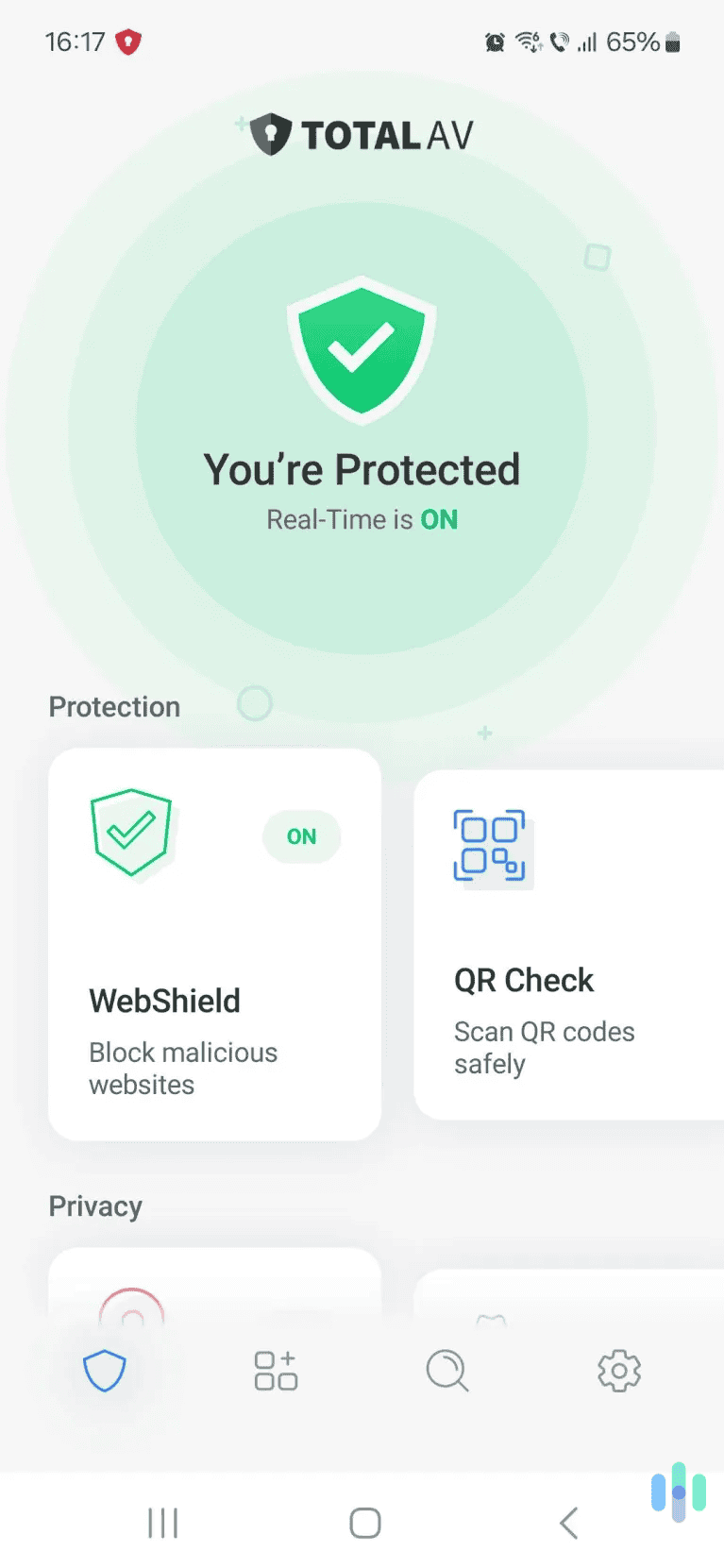
What Threats Affect Chromebooks?
Chromebooks might not get infected with viruses like desktops or laptops, but they are not immune to threats. Here are some dangers to be aware of:
- Phishing: These attacks remain the biggest threat to Chromebook users, with cybercriminals creating increasingly sophisticated fake websites that steal login credentials and personal information.
- Malicious browser extensions: These extensions can track your browsing, inject ads, or steal data within ChromeOS’s sandboxed environment.
- Network attacks: Hackers use unsecured WiFi connections to intercept your data, regardless of your operating system’s security.
- Malicious files: While Chromebooks resist infection themselves, they can still download and store files, which could infect other devices when transferred via USB or cloud storage.
Did You Know: Phishing attacks doubled in 2024, with mobile devices, including Chromebooks, receiving up to 600 threats a year.2 According to the report, hackers are taking a multichannel approach instead of relying solely on email.
Free Vs. Paid Chromebook Antivirus
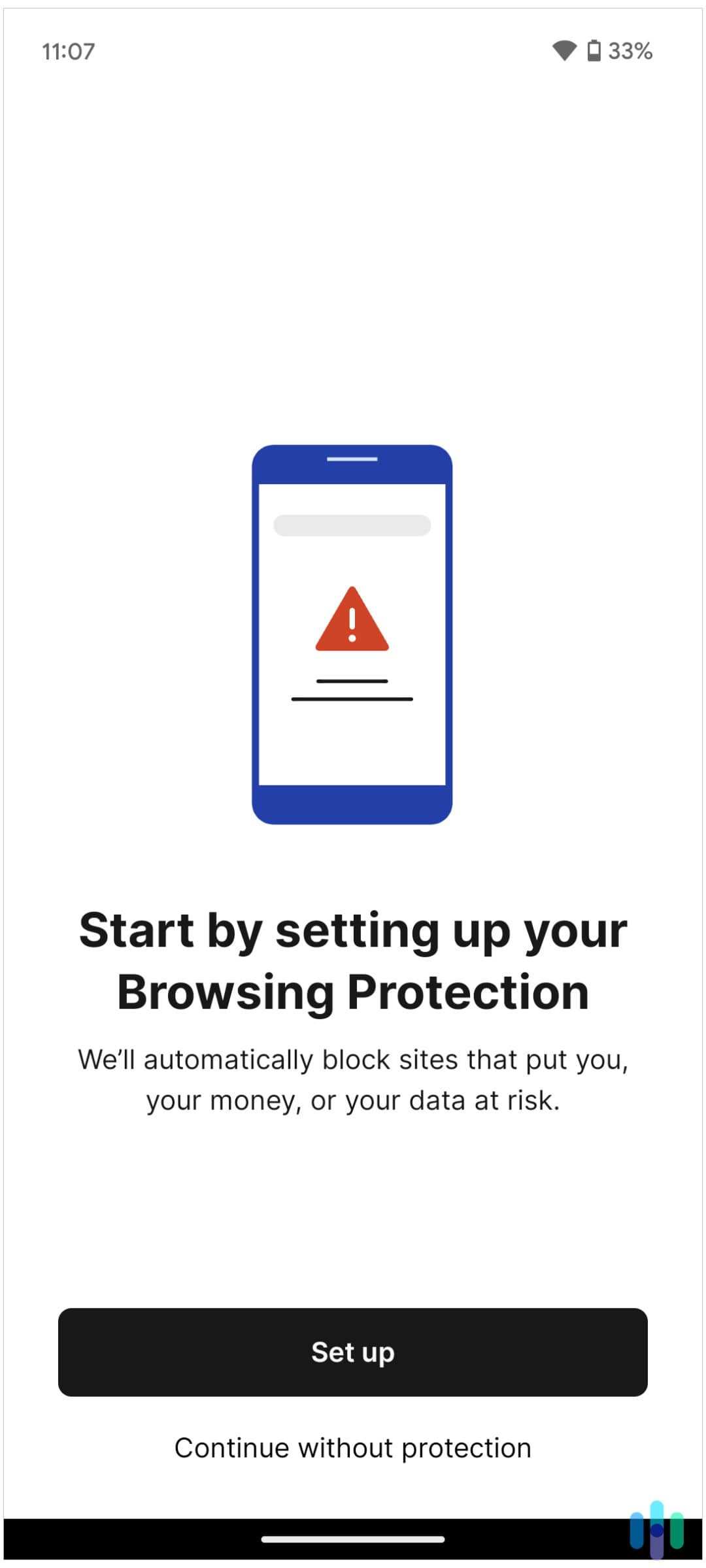
Free antivirus options for Chromebooks typically offer basic URL filtering and malware scanning through browser extensions. While we think it’s still better than no protection, free solutions often lack real-time threat updates, advanced phishing detection, and additional features like VPNs or identity monitoring. They may also display ads or repeatedly prompt you to upgrade.
We think paid solutions offer great bang for your buck with superior detection rates, regular threat intelligence updates, and comprehensive feature sets. The inclusion of VPNs, password managers, and identity protection in many paid packages provides value beyond basic antivirus.
Did You Know: Password theft was up 800 percent in the first half of 2025.3 Hackers gained these credentials via phishing and malware attacks. That is why we recommend a complete digital security solution instead of a basic antivirus plan.
Final Verdict: What is the Best Chromebook Antivirus App?
While Chromebooks don’t need traditional antivirus software, adding web protection significantly enhances your security against modern threats. We believe Norton delivers the most comprehensive protection with excellent detection rates and valuable extras like identity monitoring and VPN access.
TotalAV offers solid protection and useful optimization tools at a budget-friendly price. Guardio provides focused browser security that’s perfect if you want lightweight, effective protection. Regardless of which solution you choose, adding antivirus to your Chromebook provides an important additional layer of security that ChromeOS alone doesn’t offer.
Frequently Asked Questions
-
Can Chromebooks get viruses?
While traditional viruses can’t infect ChromeOS due to its security architecture, Chromebooks remain vulnerable to web-based threats like phishing, malicious downloads, and harmful browser extensions. These threats can steal your personal information or compromise your accounts regardless of your operating system.
-
Is free antivirus enough for a Chromebook?
Free antivirus provides basic protection against known threats but often lacks real-time updates and advanced features. Paid solutions offer superior detection rates, additional features like VPNs and identity monitoring, and better customer support when you need help.
-
Will antivirus slow down my Chromebook?
Modern antivirus extensions designed for Chromebooks have minimal impact on performance. Most use cloud-based scanning that doesn’t tax your device’s resources, and our testing showed less than three percent CPU usage increase with any of the recommended solutions.
-
Do I need antivirus if I only use Google services?
Even when using trusted services, you’re vulnerable to phishing emails, fake login pages, and compromised websites. Antivirus software provides an extra security layer that protects against threats that target users directly rather than systems.
-
Can I use Windows antivirus on a Chromebook?
Traditional Windows antivirus programs won’t work on ChromeOS since it’s a different operating system. You need antivirus specifically designed for Chromebooks, typically delivered as Chrome browser extensions or Android apps.
-
How often should I scan my Chromebook for malware?
Unlike traditional computers, Chromebooks don’t require regular full-system scans. Modern Chromebook antivirus solutions provide real-time protection that continuously monitors threats without scheduled scans, checking websites and downloads automatically as you use them.
-
APWG. (2025). Phishing Activity Trends Reports.
https://apwg.org/trendsreports -
Infosecurity Magazine. (2024). Phishing Attacks Double in 2024.
https://www.infosecurity-magazine.com/news/2024-phishing-attacks-double/ -
Cybernews. (2025). Hackers hunt passwords: theft explodes 800%.
https://cybernews.com/security/infostealer-ransomware-statistics-2025/


